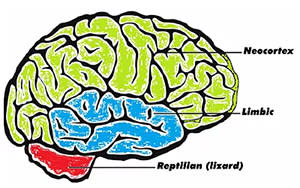How often do you ask yourself the question, “What was I thinking?!” Usually it’s right after you do or say something cringe-worthy that didn’t really reflect who you are or how you want to be perceived. So why did you do it?
Speaker and mentalist Steve Haffner explores this question in his keynote talk Conquering Virtual MindBlocks, an insightful program that challenges audience members to think about how they think so they can improve their decision making.
Speaker and mentalist Steve Haffner explores this question in his keynote talk Conquering Virtual MindBlocks, an insightful program that challenges audience members to think about how they think so they can improve their decision making.

The smallest and most primitive section of the human brain is called the reptilian or “lizard” brain, and its purpose it to keep us alive, primarily identifying potential threats. The lizard brain doesn’t care about things like maintaining strong relationships or being an effective leader or valuable team member. But we sure do! And that is how we have “virtual mind blocks.”
These are hidden impulses, biases, and assumptions our lizard brain creates that we normally aren’t aware of but that can have major impact on our decisions.
When planning your event or making any important decision, beware of the following situations where these mind blocks can occur:
-
You feel compelled to make a quick decision, even if you don’t have all the information you need to be accurate. The lizard brain wants you to act fast, which is great for animals avoiding predators but not so great for professionals. Feeling the urge to select a venue or vendor quickly before all the data is in? Perhaps slowing down would be a better choice.
-
You have a high emotional response to a possible outcome. Fear? Anger? Greed? These emotions can often skew the objectivity of our assessments. The lizard brain subconsciously elevates the probability of unlikely events happening when we have a strong emotional reaction to those events. Try to stay objective.
- You need to assess one or more people. Many variables come into play when evaluating humans, such as in a hiring situation, but some of those are biases that we aren’t aware of. Have you ever hired someone for a position because they are tall? Or good-looking? Or male (or female)? You may not think so but studies show these are common biases that often affect decisions without our awareness.
These are just a few of the ways our subconscious mind can influence us. According to Steve, “When we become aware of what our lizard brain wants, we can counter its effects and have a better chance of making decisions that align with our values and goals.”
Steve’s program is available as an entertaining general session keynote or breakout session.
Steve’s program is available as an entertaining general session keynote or breakout session.

